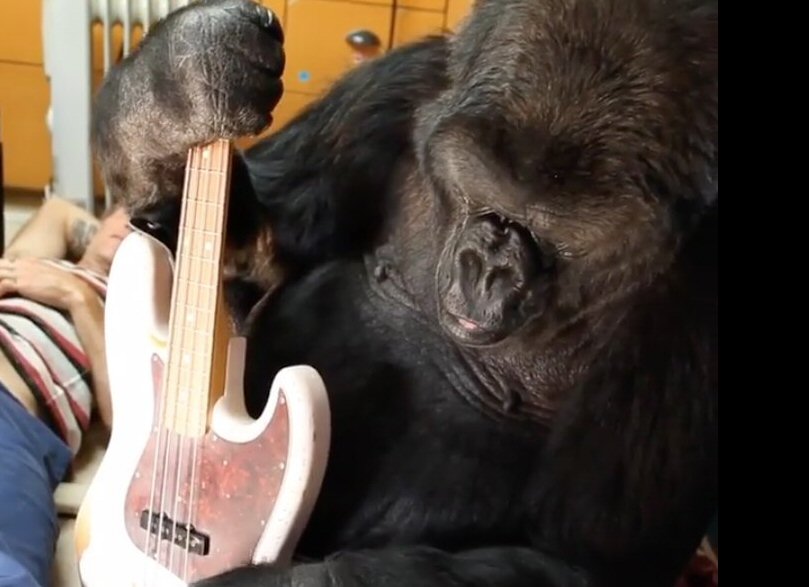Satire | Opinion | Signing apes mark civilization’s downfall
Photo courtesy of Folsom Nature/Flickr
Koko the Gorilla, who is famous for learning sign language, plays the guitar on Aug. 30, 2016. Senior columnist Andrew Prozorovsky argues that people seem to compare an animal’s intelligence to human intelligence, and not on separate terms.
March 3, 2022
If there is one thing humans love, it’s projecting human emotions, intentions and values onto animals.
The world was once infatuated with Koko the Gorilla and her kitten, All Ball. Koko had a documentary, children’s book and line of merchandise. Other psychologists tried to achieve similar results and corroborate Francine “Penny” Patterson’s findings with Koko, but to no avail. When All Ball was killed by a car, the world wept with Koko. When Koko died in 2018, the world mourned.
Although Koko was a great gorilla, Penny’s findings were suspect, and her methodology was questionable. The podcast “You’re Wrong About” does an informative and clever deep dive into Koko and Penny’s relationship.
But all this buzz about apes learning sign language has brought me sleepless nights of pondering an important and deeply personal question: “If gorillas could interpret ASL, what would I say to them?”
Presently, I am about as fluent in ASL as the average gorilla, so this counterfactual is unrealistic for more than one reason.
Get The Daily Illini in your inbox!
Social scientists have long wondered the extent to which language crafts a human’s cognitive realm. The movie “Arrival” assumes that our linear understanding of time is tied to our language. Anthropologists have convincingly argued language is the backbone of our perception of color. Lera Boroditsky’s TED Talk illustrates the many ways in which language unlocks new ways of thinking about direction, math, gender and even culpability.
So, given the gravitas of what is at stake, what should I tell a gorilla?
The Onion tells us the responsible first step would be to pass along humanity’s crippling dread of our mortality. Language inevitably engenders self-awareness. Without it, one couldn’t even get past introductions.
If we could sign with gorillas, what explanations would we owe? Let’s say, hypothetically, it is a male gorilla to avoid the endless gender ambiguity. Would he discover his captivity? Would he demand representation or to know the extent of his rights?
That headache begs the question of whether the U.S. Constitution even includes gorillas. The history of the Supreme Court reminds us that the Constitution just barely extends to women. I would love to champion gorilla suffrage, but I worry it’s not in the cards for a few generations. And if this particular gorilla lives in Florida, good luck trying to explain the rights of the incarcerated.
Would he be curious about his species’ history? Famous gorillas? I would tell him about Koko, Harambe, Donkey Kong and Caesar.
Would he want to escape? Perhaps a tunnel behind his King Kong poster, with a boat on the Mexican coast. Comedian Bill Burr worries the escapade would end with a bullet in his back, as uncertain allegiances become a double-cross. We can’t ignore a “Planet of the Apes” scenario.
Or perhaps one conversation about the grueling reality of the American workweek would convince him his physical captivity is preferable to capitalism’s mental captivity.
He would be able to finally express his tastes and preferences. At that point, it would almost be cruel to deny him what he wants. He wouldn’t understand why, unless he wanted to pursue health education.
Would he experience his own crises? I suppose it depends on what he is taught. Does he deserve to be burdened by the fear of climate change? What if I returned to a self-radicalized QAnon-supporting gorilla? Clearly, knowledge is pain.
Would he possess an ambition to pursue fulfillment? Maybe he would become an animal rights activist and testify on Capitol Hill. I know I would watch those congressional hearings.
So maybe Koko the Gorilla couldn’t sign, but it really is a good thing that she couldn’t gesture beyond “ice cream” or “kitten.” If she were truly able to understand reality beyond the shadows on the cave wall, we’d quickly have a depressed and jaded gorilla on our hands.
Koko’s success conveys more about humans than it does about animals. We erroneously base an animal’s intelligence on whether it can communicate on our terms. Communication comes in many forms. We foist our human understandings of the world onto animals. Vox’s “Explained” discusses animals’ unique ways of demonstrating intelligence.
All of these lessons are not limited to animals. It reveals a great deal about how society treats people with disabilities, those involved in outcasted movements and foreigners who speak another language.
The lessons aren’t all bad. It also reveals how desperate we are to forge bonds. We may not be able to speak or sign with our beloved pets and animal counterparts, but we crave and find connections all the same. Connection is everything, and it frequently occurs across species without spoken or gestured language, like the connection between Koko and All Ball.
Language is not the hallmark of intellect, and yet it does unlock entire cerebral worlds for us to explore. Some of those worlds are wonderful, like math, but language is also responsible for Twitter. I certainly hold a grudge against language for that.
Andrew is a senior in LAS.







